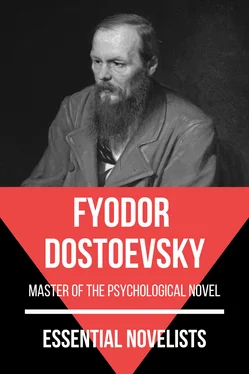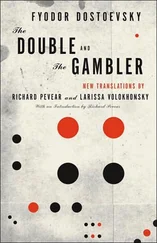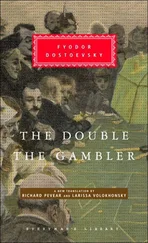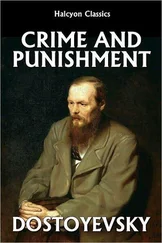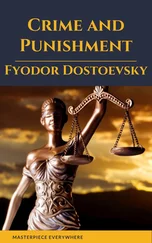Hearing that everything was going well and that Rodya had not yet waked, Pulcheria Alexandrovna declared that she was glad to hear it, because “she had something which it was very, very necessary to talk over beforehand.” Then followed an inquiry about breakfast and an invitation to have it with them; they had waited to have it with him. Avdotya Romanovna rang the bell: it was answered by a ragged dirty waiter, and they asked him to bring tea which was served at last, but in such a dirty and disorderly way that the ladies were ashamed. Razumihin vigorously attacked the lodgings, but, remembering Luzhin, stopped in embarrassment and was greatly relieved by Pulcheria Alexandrovna’s questions, which showered in a continual stream upon him.
He talked for three quarters of an hour, being constantly interrupted by their questions, and succeeded in describing to them all the most important facts he knew of the last year of Raskolnikov’s life, concluding with a circumstantial account of his illness. He omitted, however, many things, which were better omitted, including the scene at the police station with all its consequences. They listened eagerly to his story, and, when he thought he had finished and satisfied his listeners, he found that they considered he had hardly begun.
“Tell me, tell me! What do you think...? Excuse me, I still don’t know your name!” Pulcheria Alexandrovna put in hastily.
“Dmitri Prokofitch.”
“I should like very, very much to know, Dmitri Prokofitch... how he looks... on things in general now, that is, how can I explain, what are his likes and dislikes? Is he always so irritable? Tell me, if you can, what are his hopes and, so to say, his dreams? Under what influences is he now? In a word, I should like...”
“Ah, mother, how can he answer all that at once?” observed Dounia.
“Good heavens, I had not expected to find him in the least like this, Dmitri Prokofitch!”
“Naturally,” answered Razumihin. “I have no mother, but my uncle comes every year and almost every time he can scarcely recognise me, even in appearance, though he is a clever man; and your three years’ separation means a great deal. What am I to tell you? I have known Rodion for a year and a half; he is morose, gloomy, proud and haughty, and of late—and perhaps for a long time before—he has been suspicious and fanciful. He has a noble nature and a kind heart. He does not like showing his feelings and would rather do a cruel thing than open his heart freely. Sometimes, though, he is not at all morbid, but simply cold and inhumanly callous; it’s as though he were alternating between two characters. Sometimes he is fearfully reserved! He says he is so busy that everything is a hindrance, and yet he lies in bed doing nothing. He doesn’t jeer at things, not because he hasn’t the wit, but as though he hadn’t time to waste on such trifles. He never listens to what is said to him. He is never interested in what interests other people at any given moment. He thinks very highly of himself and perhaps he is right. Well, what more? I think your arrival will have a most beneficial influence upon him.”
“God grant it may,” cried Pulcheria Alexandrovna, distressed by Razumihin’s account of her Rodya.
And Razumihin ventured to look more boldly at Avdotya Romanovna at last. He glanced at her often while he was talking, but only for a moment and looked away again at once. Avdotya Romanovna sat at the table, listening attentively, then got up again and began walking to and fro with her arms folded and her lips compressed, occasionally putting in a question, without stopping her walk. She had the same habit of not listening to what was said. She was wearing a dress of thin dark stuff and she had a white transparent scarf round her neck. Razumihin soon detected signs of extreme poverty in their belongings. Had Avdotya Romanovna been dressed like a queen, he felt that he would not be afraid of her, but perhaps just because she was poorly dressed and that he noticed all the misery of her surroundings, his heart was filled with dread and he began to be afraid of every word he uttered, every gesture he made, which was very trying for a man who already felt diffident.
“You’ve told us a great deal that is interesting about my brother’s character... and have told it impartially. I am glad. I thought that you were too uncritically devoted to him,” observed Avdotya Romanovna with a smile. “I think you are right that he needs a woman’s care,” she added thoughtfully.
“I didn’t say so; but I daresay you are right, only...”
“What?”
“He loves no one and perhaps he never will,” Razumihin declared decisively.
“You mean he is not capable of love?”
“Do you know, Avdotya Romanovna, you are awfully like your brother, in everything, indeed!” he blurted out suddenly to his own surprise, but remembering at once what he had just before said of her brother, he turned as red as a crab and was overcome with confusion. Avdotya Romanovna couldn’t help laughing when she looked at him.
“You may both be mistaken about Rodya,” Pulcheria Alexandrovna remarked, slightly piqued. “I am not talking of our present difficulty, Dounia. What Pyotr Petrovitch writes in this letter and what you and I have supposed may be mistaken, but you can’t imagine, Dmitri Prokofitch, how moody and, so to say, capricious he is. I never could depend on what he would do when he was only fifteen. And I am sure that he might do something now that nobody else would think of doing... Well, for instance, do you know how a year and a half ago he astounded me and gave me a shock that nearly killed me, when he had the idea of marrying that girl—what was her name—his landlady’s daughter?”
“Did you hear about that affair?” asked Avdotya Romanovna.
“Do you suppose——” Pulcheria Alexandrovna continued warmly. “Do you suppose that my tears, my entreaties, my illness, my possible death from grief, our poverty would have made him pause? No, he would calmly have disregarded all obstacles. And yet it isn’t that he doesn’t love us!”
“He has never spoken a word of that affair to me,” Razumihin answered cautiously. “But I did hear something from Praskovya Pavlovna herself, though she is by no means a gossip. And what I heard certainly was rather strange.”
“And what did you hear?” both the ladies asked at once.
“Well, nothing very special. I only learned that the marriage, which only failed to take place through the girl’s death, was not at all to Praskovya Pavlovna’s liking. They say, too, the girl was not at all pretty, in fact I am told positively ugly... and such an invalid... and queer. But she seems to have had some good qualities. She must have had some good qualities or it’s quite inexplicable.... She had no money either and he wouldn’t have considered her money.... But it’s always difficult to judge in such matters.”
“I am sure she was a good girl,” Avdotya Romanovna observed briefly.
“God forgive me, I simply rejoiced at her death. Though I don’t know which of them would have caused most misery to the other—he to her or she to him,” Pulcheria Alexandrovna concluded. Then she began tentatively questioning him about the scene on the previous day with Luzhin, hesitating and continually glancing at Dounia, obviously to the latter’s annoyance. This incident more than all the rest evidently caused her uneasiness, even consternation. Razumihin described it in detail again, but this time he added his own conclusions: he openly blamed Raskolnikov for intentionally insulting Pyotr Petrovitch, not seeking to excuse him on the score of his illness.
“He had planned it before his illness,” he added.
“I think so, too,” Pulcheria Alexandrovna agreed with a dejected air. But she was very much surprised at hearing Razumihin express himself so carefully and even with a certain respect about Pyotr Petrovitch. Avdotya Romanovna, too, was struck by it.
Читать дальше
